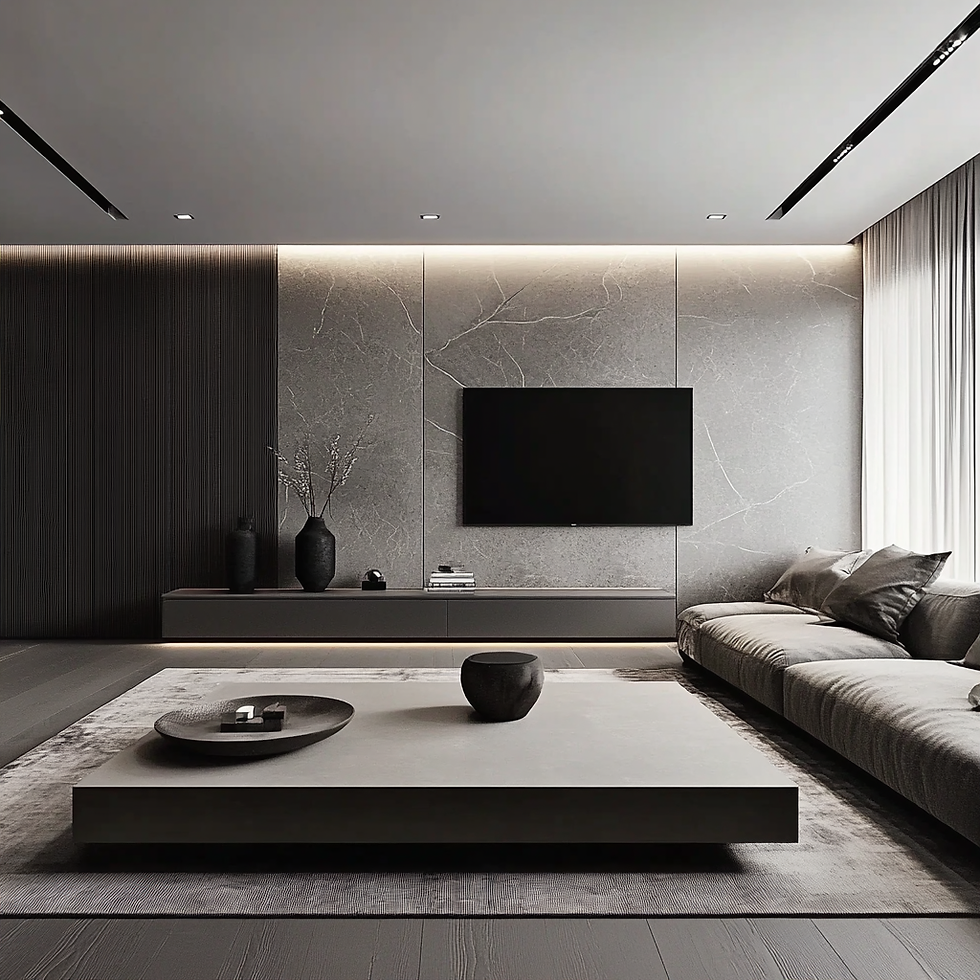The Art of Decluttering: Embracing Minimalist Interior Design
- Mariam Easa

- Jul 10, 2024
- 4 min read
Updated: Mar 15, 2025
In a world filled with incessant distractions and overwhelming stimuli, the quest for simplicity and tranquility has led many to embrace minimalist interior design. This design philosophy, rooted in the principles of simplicity and functionality, goes beyond mere aesthetic preferences. It embodies a lifestyle choice that prioritizes mental clarity, well-being, and a harmonious living environment. Let's delve into the art of decluttering through the lens of minimalist interior design and explore its principles, benefits, and practical implementation.
A Guide to Minimalist Interior Design
The Essence of Minimalist Interior Design
The Benefits of Minimalist Interior Design
Practical Steps to Achieve Minimalist Interior Design
The Minimalist Mindset

The Essence of Minimalist Interior Design
At its core, minimalist interior design focuses on the idea that less is more. This approach is characterized by the use of simple and functional elements, clean lines, and a monochromatic palette with strategic use of color to create a sense of space and serenity. The goal is to create a living environment that is both beautiful and functional, eliminating unnecessary items and distractions.
Key Principles of Minimalist Design:
Simplicity: Minimalist design strips down interiors to their essential elements. Every piece of furniture and decor serves a purpose, eliminating anything superfluous.
Functionality: Each item in a minimalist space has a specific function. Furniture is often multi-purpose, serving various needs without adding clutter.
Clean Lines: Sharp, clean lines dominate minimalist spaces, creating a sense of order and clarity. This principle applies to furniture, architecture, and even decorative elements.
Monochromatic Palette: A minimalist color scheme typically involves neutral tones such as white, black, gray, and beige. These colors create a calming backdrop and make spaces appear larger and more open.
Decluttering: Central to minimalism is the practice of decluttering. This involves removing unnecessary items, organizing belongings, and maintaining a tidy environment.
Natural Light: Minimalist interiors maximize natural light, creating an airy and open feel. Large windows, sheer curtains, and strategically placed mirrors help enhance this effect.

The Benefits of Minimalist Interior Design
Mental Clarity and Reduced Stress
A cluttered space can lead to a cluttered mind. By eliminating unnecessary items and focusing on simplicity, minimalist design promotes mental clarity and reduces stress. The organized and clean environment fosters a sense of peace and tranquility.
Enhanced Focus and Productivity
Minimalist spaces minimize distractions, allowing for better concentration and increased productivity. A clear, uncluttered workspace or living area can help individuals focus on their tasks and activities with greater efficiency.
Easy Maintenance and Cleaning
With fewer items to clean and organize, maintaining a minimalist home is significantly easier. This not only saves time but also reduces the mental load associated with housekeeping.
Sustainable Living
Minimalism encourages conscious consumption. By investing in high-quality, functional items and reducing the need for unnecessary purchases, individuals can contribute to a more sustainable lifestyle. This approach reduces waste and promotes environmental responsibility.

Practical Steps to Achieve Minimalist Interior Design
1. Decluttering Your Space
Start by evaluating your belongings and identifying items that are essential and those that are not. Adopt the "one in, one out" rule: for every new item you bring into your home, remove one. This practice helps maintain a balance and prevents clutter from accumulating.
2. Choosing Functional Furniture
Opt for furniture that serves multiple purposes. For example, a sofa bed or a coffee table with storage can help maximize space and functionality. Select pieces with clean lines and simple designs to maintain the minimalist aesthetic.
3. Creating a Neutral Color Palette
Choose a monochromatic color scheme with neutral tones. Incorporate textures and subtle variations within this palette to add depth and interest without overwhelming the senses. Use color sparingly, as an accent rather than a dominant feature.
4. Maximizing Natural Light
Allow as much natural light into your space as possible. Use sheer curtains or blinds that can be easily opened to let in light. Place mirrors strategically to reflect light and create a sense of openness.
5. Incorporating Simple Decor
Keep decor to a minimum and choose pieces that have personal meaning or serve a practical purpose. Avoid excessive ornamentation and instead, focus on the beauty of simplicity.
6. Organizing Efficiently
Invest in storage solutions that help keep your space organized. Use built-in cabinets, under-bed storage, and other clever solutions to keep belongings out of sight. Regularly assess and declutter these storage areas to maintain order.
The Minimalist Mindset
Adopting minimalist interior design is not just about changing your home; it's about changing your mindset. Embrace the philosophy of living with less and valuing quality over quantity. This shift in perspective can lead to a more fulfilling and intentional way of living, where your environment supports your well-being and personal growth.
In conclusion, minimalist interior design is a powerful tool for creating a serene, functional, and aesthetically pleasing living space. By focusing on simplicity, functionality, and intentionality, you can transform your home into a sanctuary of peace and clarity. The art of decluttering, central to this design philosophy, extends beyond physical spaces, encouraging a holistic approach to life that prioritizes what truly matters.



Comments